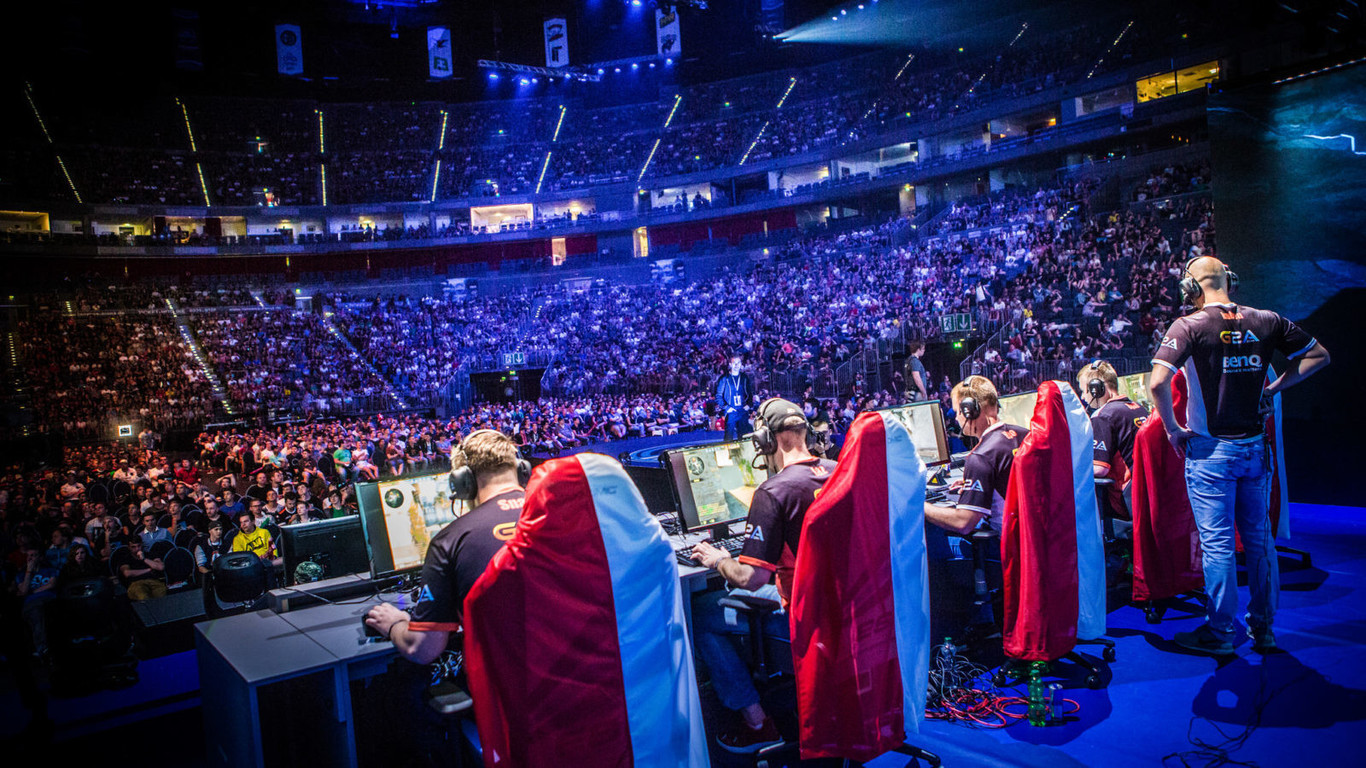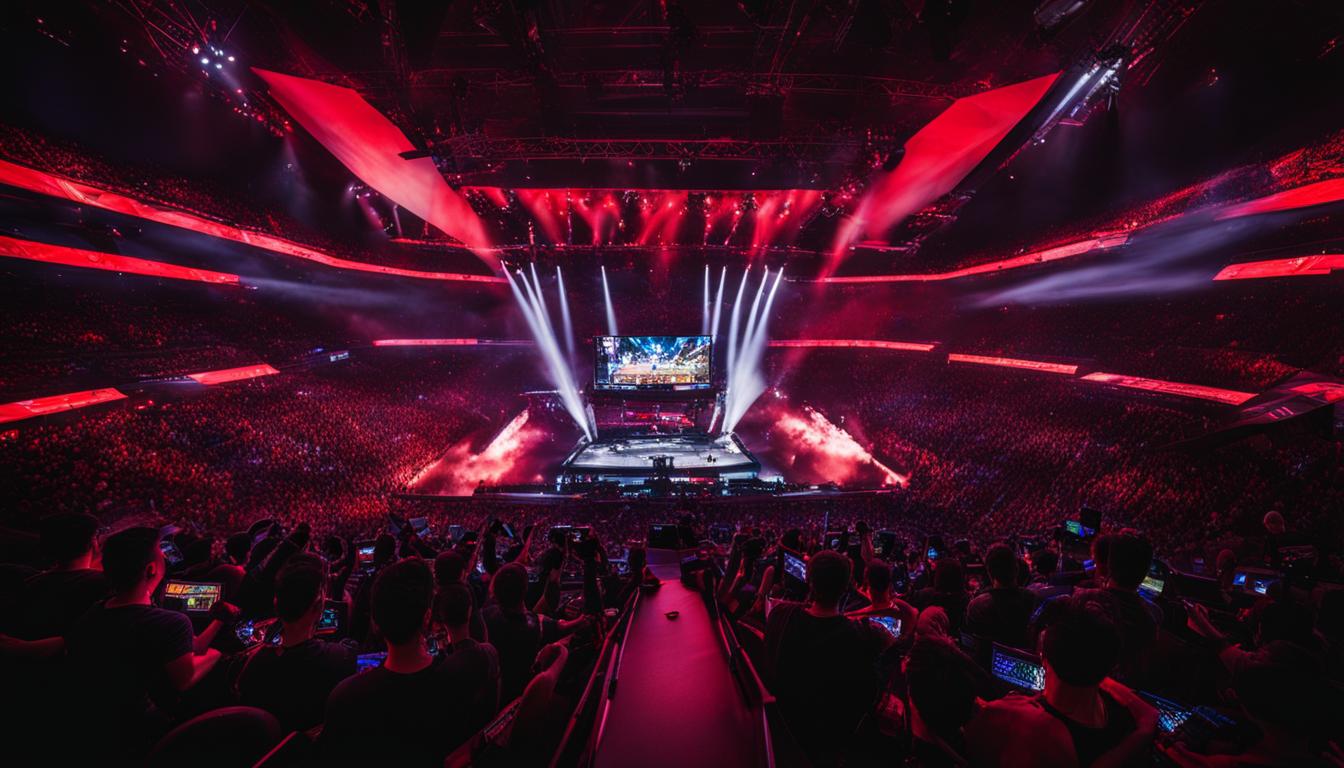Product description
Esports, short for electronic sports, has emerged as a rapidly growing and captivating industry that is transforming the world of competitive gaming. It encompasses organized, multiplayer video game competitions, where professional players and teams compete against one another in a variety of game genres, from first-person shooters to real-time strategy games. The rise of Esports has not only captivated audiences worldwide but has also created a thriving ecosystem with immense potential for growth and investment.
The Rise of Esports: A Global Phenomenon

The Esports Landscape: A Rapidly Evolving Industry
Esports has experienced a remarkable surge in popularity, with its global audience projected to reach over 500 million viewers by 2025. This astronomical growth can be attributed to several factors, including the widespread adoption of high-speed internet, the increasing accessibility of gaming platforms, and the growing popularity of competitive gaming among both players and spectators.
The Esports Ecosystem: Key Stakeholders and Driving Forces
The Esports ecosystem consists of a diverse range of stakeholders, including game developers, tournament organizers, teams, players, content creators, and a rapidly growing fan base. Each of these entities plays a crucial role in driving the industry forward, contributing to its continued expansion and the creation of new revenue streams.
The Global Reach of Esports: Transcending Geographical Boundaries
Esports has transcended geographical boundaries, with tournaments and leagues being held across the world, attracting participants and spectators from diverse cultural and demographic backgrounds. This global reach has enabled Esports to become a truly international phenomenon, fostering a sense of community and creating opportunities for collaboration and cross-cultural exchange.
See more: 77win.com
The Mechanics of Esports: From Games to Players

The Esports Game Genres: Diversity and Specialization
Esports encompasses a wide range of game genres, each with its own unique mechanics, strategies, and player skillsets. From fast-paced first-person shooters like Counter-Strike: Global Offensive to the intricate team-based strategies of Dota 2 and League of Legends, the diversity of Esports games has contributed to its broad appeal and the emergence of specialized player roles and playstyles.
The Esports Player Ecosystem: Dedication, Skill, and Teamwork
Esports players are not just gamers; they are highly skilled, dedicated professionals who undergo rigorous training, honing their reflexes, decision-making abilities, and teamwork skills to compete at the highest level. The Esports player ecosystem is characterized by a meritocratic structure, where talent, hard work, and strategic thinking are the keys to success.
The Rise of Esports Superstars: Inspiring a New Generation of Gamers
Esports has given rise to a new generation of superstars, with players like Faker, Ninja, and Doublelift becoming household names within the gaming community. These individuals have not only achieved remarkable success in their respective games but have also become influential role models, inspiring the next generation of Esports enthusiasts to pursue their passion and develop their skills.
Esports Beyond Gaming: The Business of Competition

The Monetization of Esports: Revenue Streams and Opportunities
Esports has evolved beyond a mere hobby or niche interest, becoming a thriving business with numerous revenue streams. From sponsorships and advertising to media rights and merchandise sales, the Esports industry has demonstrated its ability to generate significant financial returns for its stakeholders.
The Esports Ecosystem: Diverse Stakeholders and Collaborations
The Esports ecosystem is a complex network of stakeholders, including game publishers, tournament organizers, teams, players, content creators, and media platforms. These entities collaborate and interact in various ways, creating a dynamic and interconnected environment that drives the industry's growth and innovation.
The Professionalization of Esports: Governance, Regulations, and Integrity
As Esports continues to mature, there has been an increased focus on professionalizing the industry, with the establishment of governing bodies, the implementation of regulations, and the emphasis on maintaining the integrity of competitive play. These efforts aim to ensure the long-term sustainability and credibility of Esports as a legitimate and respected form of competitive gaming.
The Economic Potential of Esports: A Booming Industry
The Esports Market: Global Reach and Rapid Growth
The Esports market has experienced remarkable growth, with revenues projected to reach over $1.5 billion by 2023. This explosive growth can be attributed to a combination of factors, including the increasing global popularity of Esports, the influx of investments and sponsorships, and the development of new revenue streams.
The Esports Economy: Diverse Revenue Streams and Monetization Strategies
The Esports economy is characterized by a diverse range of revenue streams, including media rights, sponsorships, merchandise sales, game publisher revenue shares, and ticket sales for live events. Esports organizations and stakeholders have also developed innovative monetization strategies to capitalize on the industry's growth and engage with their audiences.
The Impact of Esports on Traditional Sports: Convergence and Collaboration
The rise of Esports has also impacted the traditional sports industry, leading to increased collaboration and convergence between the two sectors. Traditional sports teams and leagues have invested in Esports organizations, while Esports events have been held in major sports venues, creating new opportunities for cross-pollination and synergies.
Investment Opportunities in Esports: Where the Money Flows
The Esports Investment Landscape: Attracting Diverse Investors
The Esports industry has become an attractive investment opportunity for a wide range of investors, from venture capitalists and private equity firms to traditional sports franchises and media conglomerates. This influx of capital has fueled the industry's growth and enabled the development of new business models, technologies, and infrastructure.
The Esports Ecosystem: Identifying Lucrative Investment Targets
Within the Esports ecosystem, there are numerous investment opportunities across various sectors, including game publishers, tournament organizers, Esports teams, content creation platforms, and technology providers. Each of these areas presents unique challenges and potential returns, making it crucial for investors to conduct thorough research and due diligence.
The Future of Esports Investments: Emerging Trends and Opportunities
As the Esports industry continues to evolve, new investment trends and opportunities are emerging, such as the growth of mobile Esports, the integration of blockchain technology, and the expansion of Esports into non-traditional gaming genres. Savvy investors who can identify and capitalize on these emerging trends are poised to reap significant rewards.
The Future of Esports: Growth, Innovation, and Beyond
The Esports Ecosystem of Tomorrow: Technological Advancements and Innovations
The future of Esports will be shaped by technological advancements and innovations that will transform the way the industry operates. From the adoption of cloud gaming and virtual reality to the integration of artificial intelligence and machine learning, these emerging technologies will enhance the viewing experience, improve player performance, and drive the development of new game formats and competitive formats.
The Globalization of Esports: Expanding Reach and Diversifying Audiences
As Esports continues to grow, its global reach will expand, with the emergence of new Esports hubs and the diversification of its audience. This increased global footprint will foster cross-cultural collaboration, enable the discovery of new talent, and create opportunities for the industry to cater to the unique preferences and needs of local markets.
The Esports Ecosystem of the Future: Sustainability, Governance, and Professionalization
The Esports industry will also focus on ensuring its long-term sustainability, with the development of robust governance structures, comprehensive regulations, and the continued professionalization of the industry. This will help to maintain the integrity of competitive play, protect the rights and well-being of players, and establish Esports as a legitimate and respected form of competitive entertainment.
The Social Impact of Esports: Community and Culture
The Esports Community: Fostering Connections and Shared Experiences
Esports has cultivated a vibrant and passionate community, where players, fans, and enthusiasts come together to share their love of gaming, celebrate the achievements of their favorite teams and players, and engage in lively discussions and debates. This sense of community has been a driving force behind the industry's growth, as it fosters a deep sense of belonging and creates valuable social connections.
The Cultural Influence of Esports: Shaping Attitudes and Perceptions
Esports has also had a significant cultural impact, influencing attitudes and perceptions towards gaming and competitive entertainment. As Esports continues to gain mainstream acceptance, it has the potential to challenge traditional notions of what constitutes a legitimate form of entertainment and to promote the value of skill, dedication, and strategic thinking in the digital age.
The Esports Ecosystem and Social Responsibility: Promoting Inclusivity and Accessibility
As the Esports industry matures, there is an increasing emphasis on social responsibility, with stakeholders working to promote inclusivity, accessibility, and diversity within the Esports ecosystem. This includes efforts to address issues such as representation, mental health, and the overall well-being of players and fans.
Challenges and Opportunities: Navigating the Esports Landscape
Esports Regulation and Governance: Balancing Growth and Integrity
One of the key challenges facing the Esports industry is the need to establish robust governance structures and regulatory frameworks that can balance the industry's rapid growth with the maintenance of integrity and fairness in competitive play. This includes addressing issues such as player welfare, anti-doping policies, and the regulation of emerging technologies.
The Esports Talent Pipeline: Nurturing and Retaining Top Players
Esports teams and organizations also face the challenge of developing and retaining top-tier talent, as the industry's growth has led to intense competition for skilled players. Addressing this challenge will require investments in player development, training programs, and the creation of sustainable career pathways for Esports professionals.
The Esports Viewership Challenge: Engaging and Retaining Audiences
Esports organizations and content creators also face the challenge of engaging and retaining their audience, as the industry's rapid growth has led to an increasingly crowded and competitive landscape. Addressing this challenge will require the development of innovative content strategies, the leveraging of emerging technologies, and the creation of deeper connections with Esports fans.
Esports: A Force for Good: Promoting Inclusivity and Accessibility
Esports and Diversity: Fostering Representation and Inclusion
Esports has the potential to be a force for good, promoting inclusivity and accessibility in the world of competitive gaming. By fostering greater representation of diverse backgrounds, genders, and abilities, Esports can challenge traditional notions of who can participate in and excel at competitive entertainment.
Esports and Social Impact: Empowering Communities and Driving Change
Esports can also be a powerful tool for driving social change and empowering communities. Through initiatives such as charitable events, educational programs, and the promotion of positive role models, Esports organizations and stakeholders can leverage the industry's reach and influence to create a more inclusive and equitable future.
The Future of Esports and Social Responsibility: Continuous Improvement and Accountability
As the Esports industry continues to evolve, there will be an increasing focus on ensuring that the industry's growth and success are accompanied by a strong commitment to social responsibility. This will require ongoing efforts to address challenges, promote best practices, and hold stakeholders accountable for their actions and their impact on the Esports community and beyond.
Conclusion
Esports has emerged as a global phenomenon, captivating audiences and transforming the world of competitive gaming. From its humble beginnings as a niche interest, Esports has evolved into a thriving industry with immense economic potential, attracting diverse investors and collaborators from across the entertainment and sports landscapes. As the industry continues to grow and evolve, it will face a range of challenges and opportunities, including the need to establish robust governance structures, nurture and retain top talent, and promote inclusivity and social responsibility.
Despite these challenges, the future of Esports remains incredibly promising. With the continued advancements in technology, the expansion of global reach, and the increasing professionalization of the industry, Esports is poised to become an even more significant force in the world of competitive entertainment. As Esports continues to capture the imagination of audiences worldwide, it will undoubtedly continue to shape the future of gaming, entertainment, and the way we engage with and experience the digital world.
POSTER SEO_TELEGRAM



